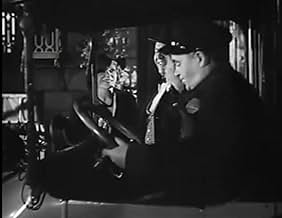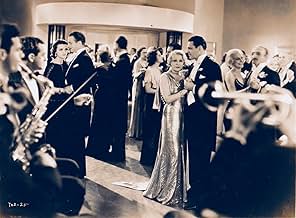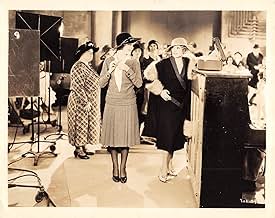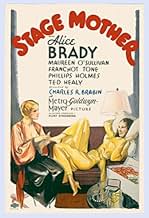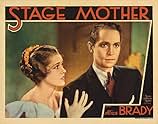Aggiungi una trama nella tua linguaA vaudeville star has to leave her daughter with her dead husband's stuffy Boston parents while she makes a living. But when the daughter shows some talent, the mother become a stage mother ... Leggi tuttoA vaudeville star has to leave her daughter with her dead husband's stuffy Boston parents while she makes a living. But when the daughter shows some talent, the mother become a stage mother and pushes her daughter into becoming a Broadway star. The mother is a monster with a hear... Leggi tuttoA vaudeville star has to leave her daughter with her dead husband's stuffy Boston parents while she makes a living. But when the daughter shows some talent, the mother become a stage mother and pushes her daughter into becoming a Broadway star. The mother is a monster with a heart of gold, and after breaking up the daughter's love affair, finally sees the error of her... Leggi tutto
- Regia
- Sceneggiatura
- Star
- Premi
- 1 vittoria in totale
- Dexter's Butler
- (non citato nei titoli originali)
- Hors D'Oeuvres Waiter
- (non citato nei titoli originali)
- Mr. Mark Thorne
- (non citato nei titoli originali)
- Mustached Man With Badge
- (non citato nei titoli originali)
- Nurse
- (non citato nei titoli originali)
- Miss Gilford - Kitty's Music Store Boss
- (non citato nei titoli originali)
- Music Store Customer
- (non citato nei titoli originali)
- Mr. Sterling - Dance Instructor
- (non citato nei titoli originali)
- Audience Member
- (non citato nei titoli originali)
- …
Recensioni in evidenza
Co-screenwriter Bradford Ropes, who also wrote the novel on which "42nd Street" is based, knew this tawdry milieu intimately and wasn't afraid to expose its seamy sides; fortunately, the movie came just before the Production Code, so its portrayal of the shabbiness and moral compromises of the show biz doesn't pull its punches. It resembles "Gypsy" and the great early talkie "Applause," and in particular, its look at backstage and onstage vaudeville is historically fascinating. Its main shortcoming is a too-fast, too-tidy final reel that races unconvincingly toward a happy ending. Also, Maureen O'Sullivan, pretty and spirited as always, doesn't really convince as a young miss aiming to become the toast of Broadway. (She's dubbed, and that's clearly a double dancing in the long shots.) Till that rushed denouement, though, it's a brash and winning backstager, and Brady's uncompromising, unsympathetic performance stays with one for days.
When the film begins, Kitty (Alice Brady) is a stage star, as is her husband. However, he's killed and Kitty is stuck...pregnant and without much of a life for the kid. So, she moves in with the husband's family and spends a few years living the suburban life. However, she becomes bored and goes back to the hard life of the vaudeville stage and she leaves her daughter with his family. Years pass, Kitty's prospects are exhausted so she takes a behind the stage job--and brings her daughter, Shirley (Maureen O'Sullivan) to live with her. Kitty doesn't do this out of the goodness of her heart. Her plan is to make Shirley a star and live off her! And for the remainder of the film, Kitty manipulates her daughter and sees her rise to the top. But, when Shirley meets a nice guy (Franchot Tone) and wants to settle down, Kitty decides to destroy this relationship for her own selfish reasons. What's next? See the film...or not.
As I mentioned, the characters (particularly Kitty) all seem like low-lifes. As for Shirley, she's nice...but in a very bland way and has little backbone. All in all, a curiously uninvolving story that should have been either more humanized or more hard-edged.
By the way, there are a lot of song and dance numbers that looked like they were choreographed by Busby Berkeley's less talented cousin...or dog.
The crazy life of a theater performer in the 1930s, is the main drive of the plot. The kid grows up to be Maureen O'Sullivan. Yes, that Maureen O'Sullivan. The one, who would go on to play Jane, in six of the Johnny Weissmuller, Tarzan films. After staying with her grand parents for a number of years, Shirley is reunited with her mother, Kitty. She is 16 years old and this is the point O'Sullivan steps in for her character. In fact, I was impressed with the way the filmmakers made-up 22 year old O'Sullivan, to age from 16 to her 30s. So, stage Mother wants her daughter to be a dancer. An idea, Shirley isn't to keen about, but accepts the direction her life is about to go in, thus setting up a possible Mommy Dearest scenario. Fortunately, Shirley will age to a point, that the Mommy Dearest phase doesn't fester.
When Shirley goes for her first try-out, the collection of kids routines were pretty funny. I did notice some bad edits in Stage Mother (1933), even by 1933 standards, but the camera work was really nice. 55 minutes into the film, Shirley breaks up sadly, with her man she is seeing and minutes later, does a great show, with some amazing sets, created for the dance numbers. Some may question moments of the acting in the movie, but I liked C. Henry Gordon as Ricco. The film ends kind of quickly and abruptly, plus there's a uneasy feeling, that things didn't go the way you thought they would. The happy music, playing out to the film's end, doesn't hide the real anguish behind Shirley's eyes. Did Mommy Dearest actually win? Stage Mother (1933), is still a cinematic artifact, from an earlier time. I thought it was cool. It's not a great film, but still, fairly good.
6.3 (D+ MyGrade) = 6 IMDB.
Stage Mom is Alice Brady's picture as she cajoles and plays hardball with all comers to advance her daughter's career including pimping her to a prominent politician causing things to get hot enough to blow town and head for Europe. Brady's raspy voice suits her hard bargaining style well as she negotiates with some pretty tough customers along the way. O'Sullivan's Shirley is sharp innocent counterpoint to a point of insipid. She dances poorly and remains naive and childlike most of the picture while her suitors (Franchot Tone and Phillip Holmes) can only wish they had a backbone like Kitty.
The dance scenes are flat and uninspired as director Charles Brabin does his best to mask O'Sullivan's abysmal hoofing abilities with close-ups while at the same time offering some pretty racy pre code enforcement shots of the chorus replete in diaphanous costume.
There are a handful of well played scenes (particularly with C. Henry Gordon) in Stage Mother as Brady brawls her way to the top with tough talk and a touch of extortion void of sentiment but in the end it depends on sentimental tug to bring the curtain down and the limpid denouement forcing Kitty to go meekly simply reinforces the films mediocrity.
Lo sapevi?
- QuizLarry Fine's only solo screen appearance without his partners in The Three Stooges.
- BlooperTap dancing is heard during the child contortionist's audition.
- Citazioni
Kitty Lorraine: I'm going to Boston to Fred's people. They sent me a telegram.
Blonde: What, live in Boston? I'd hate to take a kid as young as that one to that town. It's liable to make her peculiar for life!
- ConnessioniReferenced in Amanti fuggitivi (1934)
- Colonne sonoreAny Little Girl, That's a Nice Little Girl, Is the Right Little Girl for Me
Music by Fred Fisher
Lyrics by Thomas J. Gray
Sung by Alice Brady at the music store
I più visti
Dettagli
- Tempo di esecuzione1 ora 25 minuti
- Colore
- Proporzioni
- 1.37 : 1
Contribuisci a questa pagina


